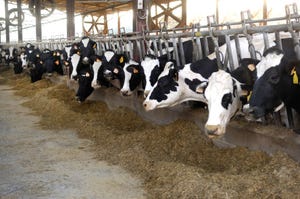Trade on the minds of World Pork Expo attendees as future unclear.

“Trade is on everybody’s mind,” Jim Heimerl, president of the National Pork Producers Council (NPPC), told the media during the opening day of the 2018 World Pork Expo, being held June 6-8 in Des Moines, Iowa.
This week, Mexico announced a 10% tariff on U.S. pork, adding to the already 25% tariff that China had placed on U.S. pork back in April. Both moves were retaliation for U.S. tariffs on steel and aluminum imports, Heimerl explained.
Iowa State University economist Dermot Hayes has calculated that since March 1, hog futures have dropped $18/head and are still falling.
“That’s a $2.2 billion industry loss on an annualized basis,” Heimerl said. “We need to get this fixed now.”
Steve Meyer, economist for Kerns & Associates, told attendees during an outlook session that China is a major market for U.S. variety meats, taking 60% of product. However, he said byproduct value has continued to increase since the tariffs. “That’s a surprise to us.”
Since Mexico is the second largest destination for U.S. pork, Meyer anticipates the more recent tariff will have a greater impact on the industry.
“We appreciate all of the trade issues the Administration is balancing, but we’re starting to take on water fast,” Heimerl said. “The President said he wouldn’t abandon farmers, and we’ve taken him at his word, but we need these trade disputes to end now.”
Exports are absolutely essential to the U.S. pork industry, he added. “Last year, our industry exported $6.5 billion. That represents almost 27% of what we produce in this country.”
“We understand we are in a new trade environment. The Trump Administration is more cautious when it comes to trade agreements,” he said. “It’s important we look for other opportunities to increase U.S. pork exports. We’re always looking for new opportunities, but we need to make sure we regain the ones we have lost.”
Working closely with Administration
Heimerl emphasized that the U.S. pork industry isn’t “going to throw rocks” at the Administration. “We want them to be our allies. They hear what we’re saying. They’re working with us.”
Nick Giordano, NPPC vice president and counsel of global government affairs, said pork producer leadership and NPPC staff have been working closely with the Administration to help it understand the impact the events are having on producers.
“It’s very painful for us. We’re the biggest single sector in the United States that’s right now taking it on the chin,” Giordano said. He called pork producers “patriots,” praising them for being very measured and very patient, giving the Administration time to get things right.
“It’s an uphill climb. Our message is: We’re taking on water fast; there’s a lot of blood on the floor. But, we’re giving this Administration the benefit of the doubt."
Giordano said he wished he could tell producers that everything is going to be okay but added that he can’t. “We don’t know. We’re at the tip of the spear here.”
He continued, “Believe me, they understand that this is very difficult for producers. Again, I give producers a lot of credit because a lot of value has been lost in the industry. These are tough financial times but producers are hanging tough and really they are being patriots here.”
Preserving export markets critical
Neil Dierks, NPPC chief executive officer, pointed out the significant role exports have played to the industry’s growth. In 1995, he said the U.S. was a net importer of pork, but in 2017, the U.S. exported 27% of its production.
While that growth took time, Dierks said most pork producers have a long view. “These kinds of things take time to resolve,” he said. “This is going to take some time to work through.”
“We have to understand this is a long game plan, and we have to have a long-term view, because long-term exports mean opportunity for hog farmers and for rural America,” Dierks said.
Giordano pointed out that, on average, over the past 10 years, the U.S. has been the biggest global exporter of pork, with 110, 000 U.S jobs based solely on exports.
“It’s an important sector; it’s a sector that has been growing,” he said. “In some regard, I think we can say that the pork industry has helped make rural America great again. We’ve been an engine of development to rural America.”
Now, however, Giordano said the industry is stepping backward due to the punitive tariffs in China and Mexico. “Pork producers are being patient; they’re being patriot. But, ultimately we’ve got to be able to trade because we are an extremely competitive industry.”
Despite the “rocky times” David Herring, NPPC president-elect, said the industry is still really positive about the future.
“There is more pork getting consumed in the world today than ever. And there is more demand for our pork,” he said. “When we get through these rocky times, I think the capital that has been put into this industry will be well spent.”
Dierks said the industry continues to work with the current Administration to help unleash the sector’s potential, noting that the current actions aren’t closures but rather duties.
USDA committed
Greg Ibach, U.S. Department of Agriculture under secretary for marketing and regulatory programs, spoke at a luncheon, wherein he tried to reassure producers about the current trade negotiations.
“I want to reemphasize the fact that Secretary [Sonny] Perdue and everybody on the USDA team knows how important trade is to agriculture and how much of our agricultural production is destined for an export market and how those incremental exports make a big difference in price. But, we are also cognizant, just as you are, that they playing field isn’t necessarily level,” he said.
He relayed that some countries make decisions to tweak their rules and that the Administration is seeking “consistency of application.”
“We’re not opposed to meeting a country’s standards for gaining access to its markets as long as those standards represent international standards and are applied consistently and evenly. I think that’s something we can all support and move forward on.”
Further he stated that the Administration is aware that the industry is at the “tip of the spear.”
“We know that you probably have as much anxiety over the day-to-day news as any industry in the agriculture industry. But, know that we at USDA are working hard to be able to provide the factual information and be able to evaluate and put forward suggestions into that trade negotiation debate that we hope at the end of the day will provide more opportunities for U.S. agriculture and better, more consistent, more reliable markets across the world for U.S. agriculture.”
The Administration has said they want to stand by farmers and ranchers during the process, he added. “We look forward to continuing to work together as an agriculture industry, with USDA at the forefront of advocating for each and every one of you.” A big part of that, he explained, is conversations with the industry wherein it can express concerns and ideas to help the Administration make the right decisions and advocate for the right decisions.
“I just want to pledge that our ears are always open, our doors always open, and we look forward to working together with you in the future,” Ibach said.
About the Author(s)
You May Also Like



